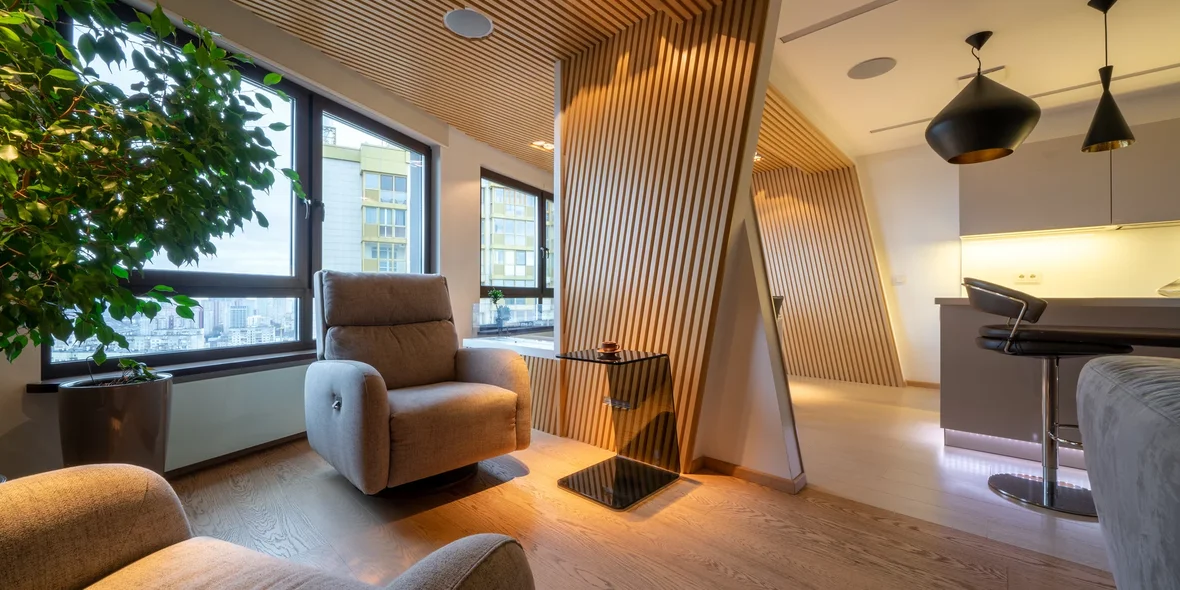
Apartments: What They Are and How They Differ from Flats
An apartment is one or more premises that can be used for permanent living. This type of real estate normally includes a kitchen, a bathroom, and a living area. Depending on its type, an apartment is possible to be located in a residential complex or commercial building (in this case, its premises are considered non-residential; however, they are equipped with everything you need for living)
The main characteristics of apartments are:
- The status of non-residential premises (not always, but in many cases)
- Availability of hotel services and infrastructure
- Furnished and equipped with kitchen/kitchen area
- Management by a specialized management company
How does it differ from a flat?
An apartment differs from a flat in terms of its legal status. Legally, it is considered non-residential real estate, like restaurants and offices, for instance. The developer is not obliged to provide apartments’ residents with such facilities as supermarkets, schools, kindergartens, and other infrastructure. Future owners should take into consideration that it’s not allowed to get permanent registration in such buildings due to the fact that it can cause difficulties while getting children enrolled in school or kindergarten.
Management and operation also have differences. For apartments, these functions are performed by a management company and HOA. Apartments, on the other hand, are serviced by a specialized management company.
Utility bills are also worth considering. In apartments, due to their non-residential status, utilities are on average 15–25% more expensive than in flats of the same size. The same situation is with the property tax, which is higher in apartment complexes than in blocks of flats.
Apartment types
This kind of property is generally subdivided into 4 types:
- Apart-hotels. Accommodation for rent. Residents can enjoy the same services which are provided in hotels.
- Profitable houses. Normally, investors purchase such real estate to rent it out and make a profit.
- Condominium. It’s really popular in the USA. You can rent it first, and then purchase it for personal use.
- Multifunctional complexes. Apartments in these buildings are more like regular flats. They can be sold, rented out, and used for permanent living.
Pros and cons of owning an apartment
Owning an apartment has its advantages and disadvantages.
Pros:
- Hotel services. When buying an apartment in a hotel, the owner can regularly order room service and meals. Convenient location. Apartment complexes are often constructed in the city centre with well-developed infrastructure or on the outskirts with very good ecology.
- High demand. This type of real estate is very suitable for rent. People on business trips, foreign students, and young families are most interested in it.
- Impossibility of foreclosure. According to the law, properties in apartment complexes are not residential. Consequently, there is no possibility of foreclosure in the event of any unpaid debts.
- Open plan. In most cases, the owners are able to make their own layout.
Cons:
- Impossibility of registration. If your accommodation is in a commercial building, you can’t register anyone or be registered yourself in it. However, hotel apartments’ owners have such an opportunity.
- No privileges are provided. As long as apartments are non-residential premises, the buyer can’t purchase one using a subsidy or family capital, or other state privileges.
- Complicated rearrangement. Owners are required to comply with special standards due to the fact that apartment complexes belong to the commercial type of real estate.
- Dependence on the management company. You will have to reckon with the decisions of this organization regarding any renovations or innovations in the complex.
Features of apartments in different countries
The legal status and features of apartments can vary significantly from country to country.
In the United Arab Emirates, the legal status of apartments is often similar to the Russian one, and officially they belong to non-residential real estate. There are especially a lot of such objects in Dubai in freehold zones.
In the UK, apartments are considered to be full-fledged housing for permanent residence. There is a distinction between rental apartments and those owned under the system of lisgold* or shared ownership (share of freehold).
In France, apartments (appartements) are equated with residential premises and can be purchased for ownership or rented. Ownership is often formalized through a copropriété scheme, which requires management through a co-owners' association.
In Germany, the term Eigentumswohnung is used for owned apartments in apartment buildings. The term Ferienwohnung, on the other hand, applies to apartments and apartments for tourist rentals.
* A type of ground lease in England that gives the owner the right of ownership for a pre-agreed period of time and under pre-agreed terms.
Summarizing the above, the purchase of apartments is well suited to those who want to live in the city center and at the same time use hotel services. However, if registration, benefits, low taxes, and developed infrastructure are of paramount importance, it is better to opt for an ordinary apartment.
To summarize, the purchase of an apartment is good for those who want to live in the city centre and still enjoy hotel services. If registration, benefits, low taxes, and a developed infrastructure are of primary importance, it is better to opt for an ordinary apartment.








